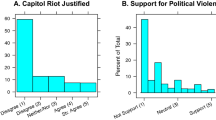Abstract
Nationalism is normally directed against closest neighbors. This simple fact -- The Hated Neighbor Truism -- has important consequences, mostly overlooked in moral debates on nationalism. First, it undercuts the defense of nationalism based on the (alleged) moral worth of proximity: since nationalists hate closest neighbors, they cannot consistently rely upon such defense. Second, it blocks the usual theoretical contrast of nationalism with cosmopolitanism: the main enemies of the nationalist are not indiscriminate cosmopolitans, but the neighbor-lovers, call them “macro-regionalists”. Finally, it suggests that the proper response to nationalism is a graded, region-sensitive moderate cosmopolitanism.
Similar content being viewed by others
REFERENCES
Baertschi, B, (to appear), Le charme secret du patriotisme,manuscript (University of Geneve).
Bibo, I. (1986), in Albin Michel (ed.), La misère des petits Etats de l'Europe de l'Est (Paris).
Fletcher, G. 'The Case for Linguistic Self-Defense', in R. McKim and J. McMahan (eds.) (1997).
Hurka, T. (1997), 'The Justification of National Partiality', in R. McKim and J. McMahan (eds.).
Kuran, Burcoglu N. (ed.) (1997), Multiculturalism: Identity and Otherness (Istanbul: Bogazici University Press).
Kymlicka, W. (ed.) (1995), The Rights of Minority Cultures (Oxford: Oxford University Press).
Leydet, Dominique (1992), 'Patriotisme constitutionnel et identité nationale', in M. Seymour (ed.).
Lichtenberg, J. (1997), 'Nationalism, for and (Mainly) Against', in R. McKim and J. McMahan (eds.).
Margalit, A. (1997), 'The Moral Psychology of Nationalism', in R. McKim and J. McMahan (eds.).
McIntyre,A. (1994), 'Is Patriotisma Virtue', in M. Daly (ed.), Communitarianism (Belmont, CA: Wadsworth).
McKim, R. and J. McMahan (eds.) (1997), The Morality of Nationalism (Oxford: Oxford University Press).
O'Neill, O. (1993), 'Justice, Gender, and International Boundaries', in M. Nussbaum and A. Sen (eds.), The Quality of Life (Oxford: Clarendon).
O'Neill, O. (1982), 'Distant Strangers', in Koller and Puhl (eds.), 1997, Current Issues in Political Philosophy (Vienna: Hölder-Pichler-Temsky).
Oldenquist, (1982), 'Loyalties', Journal of Philosophy 79, pp. 173-194.
Pierre-Caps, Stephane (1995), La Multination, l'avenir des minorités en Europe Centrale et Orientale (Paris: Editions Odile Jacob).
Seymour, Michel (ed.) (1992), Une nation peut-elle se donner la Constitution de son choix? Numéro special de Philosophiques, vol. XIX, no. 2.
Tamir, Yael (1993), Liberal Nationalism (Princeton, N.J.: Princeton University Press).
Waldron, Jeremy (1995), 'The Cosmopolitan Alternative', in Kymlicka (ed.).
Rights and permissions
About this article
Cite this article
Miscevic, N. Close Strangers. Studies in East European Thought 51, 109–125 (1999). https://doi.org/10.1023/A:1008664319975
Issue Date:
DOI: https://doi.org/10.1023/A:1008664319975




